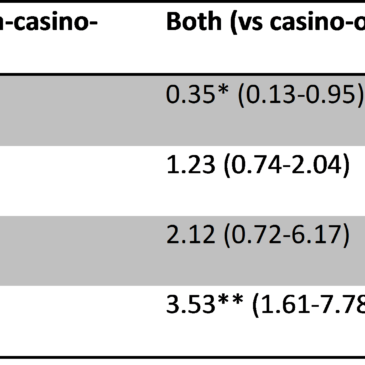With casino gambling expansion occurring around the world, researchers continue to monitor the relationship between gambling and health outcomes. Some studies have suggested that different gambling venues relate to adverse health outcomes. For example, some studies have found that gambling that occurs outside of casinos (i.e., card-playing) is strongly associated with drug and alcohol use and gambling problems, while others have linked casino gambling with gambling problems (Welte et al., 2007; Goudriaan et al., 2009). As part of our Special Series for Alcohol Awareness Month, The WAGER reviews a study that looks at differences in alcohol use and general health outcomes for recreational gamblers who frequent casinos vs. other types of venues (Franco et al., 2011).
Method
- Researchers used results from the Gambling Impact and Behavior Study (GIBS; Gerstein et al., 1999), a telephone-based national study of gambling behavior. The survey used random digit dialing to select a sample of 2417 U.S. adults over the age of 18 who gambled recreationally.
- The analyses excluded individuals who did not provide information on their gambling status or screened positive for gambling disorder.
- The GIBS collected a variety of health-related variables, including the following:
- Frequency, quantity, and choice of gambling venue;
- Describing their general health as “good” or “excellent” versus “fair” or “poor”
- Past-year alcohol use and abuse (based on DSM-IV criteria);
- Age when they began gambling
- The researchers compared the health behaviors of members of 3 exclusive groups based on self-reported choice of gambling venue:
- Casino only (i.e., participating in any game played in a casino during the past year), n=93, 38.6% male, 27.6% under 30 years old;
- Non-casino only (e.g., participating in any race track, off-track betting, lottery, bingo, or computer gambling during the past year),n=875, 52.3% male, 22.8% under 30 years old; and
- Both (i.e., gambling in both settings during the past year), n=500, 51% male, 22.8% under 30 years old
Results
- As shown in the first column of The Figure, those who gambled in non-casinos only were more likely to gamble before age 18 than those who gambled in casinos only.
- As shown in the second column of the Figure, compared to those who gambled in casinos only, those who gambled in both settings reported worse general health and a greater likelihood of gambling before age 18.
- As shown in third column of the Figure, compared to those who gambled in non-casinos only, those who gambled in both settings reported a greater likelihood of past year alcohol use and abuse.

Figure. Odds ratios (95% confidence intervals) for associations between gambling type and selected health outcomes in a sample of recreational gamblers.* p < .05 ** p < .01. Click image to enlarge.
Limitations
- Because it was cross-sectional and only evaluated gambling behavior during the past year, this study could not trace the progression of people’s gambling behavior over time.
- Self-report of gambling is susceptible to memory and self-presentation biases.
Discussion
The results of this study suggest that people who gamble recreationally in a variety of settings begin to gamble earlier, experience poorer general health, and drink in riskier ways than those who gamble in more narrow contexts. This ties in well with previous gambling involvement research which suggests that people who engage in many different gambling activities are more likely than others to report gambling-related problems (LaPlante, Nelson & Gray,2013) Here, the poor outcomes associated with multi-venue play included problem alcohol use. Because the study was cross-sectional, we cannot say with certainty whether people who use alcohol in a risky way go on to gamble at multiple venues, or whether the multi-venue gambling leads to risky drinking patterns. To get a better picture of the relationship of drinking and the development of adverse health outcomes, future studies could trace recreational gamblers’ drinking habits longitudinally while assessing for gambling disorders at critical milestones.
– Kat Belkin
What do you think? Please use the comment link below to provide feedback on this article.
References
Franco, C.A., Maciejewski, P.K., Potenza, M.N. (2011). Past-year recreational gambling in a nationally representative sample: Correlates of casino, non-casino, and both casino/non-casino gambling. Psychiatry Research, 188, 269-275.
Gerstein, D., Hoffman, J., Larison, C., Engelman, L., Murphy, S., Palmer, A., Chuchro, L., Toce, M., Johnson, R., Buie, T., Hill, M.A.(1999). Gambling impact and behavior study. Report to the National Gambling Impact Study Commission. Chicago, USA: National Opinion Research Center at the University of Chicago.
Goudriaan, A.E., Slutske, W.S., Krull, J.L., Sher, K.J. (2009). Longitudinal patterns of gambling activities and associated risk factors in college students. Addiction, 104, 1219–1232.
LaPlante, D. A., Nelson, S. E., & Gray, H. M. (2013, August 5). Breadth and depth involvement: Understanding Internet gambling involvement and its relationship to gambling problems. Psychology of Addictive Behaviors. Advance online publication. doi: 10.1037/a0033810.
Welte, J.W., Barnes, G.M., Wieczorek, W.F., Tidwell, M.O., Hoffman, J.H. (2007) Type of gambling and availability as risk factors for problem gambling: a Tobit regression analysis by age and gender. International Gambling Studies, 7, 183–198.




